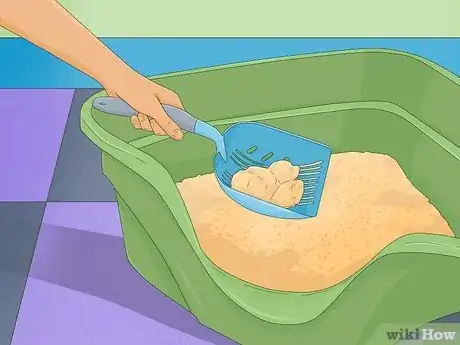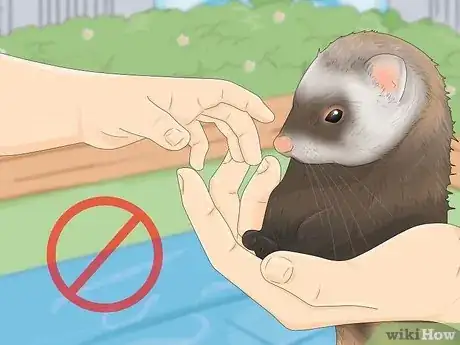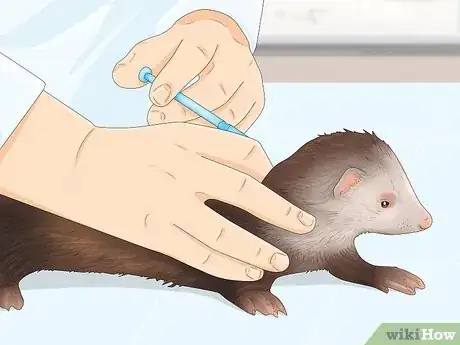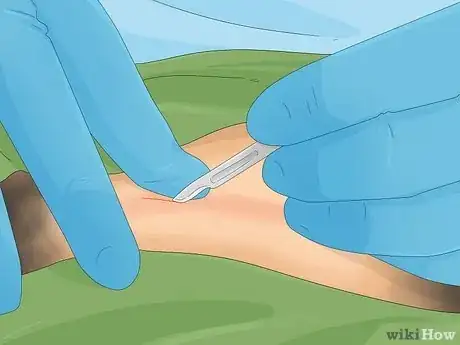This article was co-authored by Pippa Elliott, MRCVS. Dr. Elliott, BVMS, MRCVS is a veterinarian with over 30 years of experience in veterinary surgery and companion animal practice. She graduated from the University of Glasgow in 1987 with a degree in veterinary medicine and surgery. She has worked at the same animal clinic in her hometown for over 20 years.
wikiHow marks an article as reader-approved once it receives enough positive feedback. In this case, 100% of readers who voted found the article helpful, earning it our reader-approved status.
This article has been viewed 164,142 times.
Ferrets are fun and interactive animals, often described as perpetual kittens. Ferrets can be a great pet to own, but there are things to consider before adopting a ferret. Ferrets require a big time commitment. You will need to play with your ferret daily and spend a great deal of time ferret proofing your home. Your household should also be compatible with a ferret. Ferrets may not get along with young children and smaller pets. Also, consider cost. Ferrets can be pricey to adopt and purchase, and also come with a variety of medical requirements.
Steps
Considering the Time Commitment
-
1Think about the time commitment of ferret-proofing your home. Before you get a ferret, you will need to spend a great deal of time setting up. You will have to run many errands gathering supplies, and then take an afternoon to assemble them in your home. In the event you move, you will have to repeat the process. Be honest with yourself about whether you have time for ferret proofing.[1]
- You will have to fill in any holes or gaps in furniture or walls, ferrets love to crawl and hide in such areas. You will also have to hide heavier objects, like stereos and speakers, in cupboards. Ferrets love to climb, and can knock such objects over and get hurt.[2]
- Staircases need to be blocked off, and household furniture made of products like wood will need protection. Ferrets will chew such objects.
- Cleaning and upkeep of your home will be more timely when you have a ferret. Ferrets will chew almost anything, and can get hurt if they chew or swallow the wrong object. Therefore, you will have to keep your home very clean if you're housing a ferret.
-
2See if you have enough time to play with a ferret. Ferrets are social animals. They will not be happy if they don't have time to play with a human companion. A ferret is, by no means, a hands off pet, so make sure you can dedicate adequate time to playing with your ferret.[3]
- Ferrets do sleep a lot. They tend to be sleeping for about 18 hours a day. However, during times when they are awake, they are very active and need a lot of stimulation.
- Do not leave a ferret in a shelter or cage for the entire day. You will need to spend several hours a day playing with your ferret to keep it healthy and happy.
Advertisement -
3Remember that ferrets require training. Litter training is important for a ferret, as you don't want a ferret having accidents around the home. Also, ferrets must be taught proper behavior. You will need to dedicate time to training your ferret not to bite and scratch.[4]
- Ferrets are intelligent and highly trainable. However, like any animal, training takes time and persistence. You will have to train your ferret over the course of several weeks, and always punish negative behaviors like biting. This can be time consuming, so you should not adopt a ferret if you don't feel you have time to train it.[5]
-
4Keep cleaning time in mind. Ferrets have a litter box that must be changed daily, like a cat's litter box. You will also need to periodically clean their cage. While these are small chores that do not usually take long, keep them in mind when thinking about time. Every core needed to keep a ferret adds up, and you should not adopt a pet unless you can commit to all aspects of its care.[6]
-
5Remember a ferret's lifespan. This is especially important if you're purchasing a younger ferret. Ferrets don't live as long as some pets, like smaller dogs and cats, but their lifespan is not brief. Ferrets live between 6 to 10 years. You do not want to adopt a ferret if you will potentially have to give it up in a few years.
- Think about the stability of your living situation. If you're going to be moving from year to year, it can be difficult to find places that allow ferrets. Unlike dogs and cats, there may be specific rules against ferrets or similar animals in certain places due to their odor.
- Consider other factors. Are you going to start a new career, finish a school program, travel, or make any other big changes? If so, it may be difficult to keep your ferret in the long term.
- If you want a ferret, but worry your life is too unsettled, you can always consider adopting an older ferret rather than a baby.
Evaluating Your Household
-
1Avoid a ferret if you have young children. Ferrets do not do well with young children. Ferrets will bite if handled roughly. If your children are not old enough to know how to gently handle an animal, a ferret is not the pet for you.[7]
- Ferrets can get along well with older children, however. If your kids know how to safely handle an animal, and have been gentle with animals in the past, a ferret can be a great addition to your home.
-
2Think about how busy your home is. If there's a lot of coming and going in your home, there are two major concerns. First, ferrets are underfoot a lot. If there are frequently a lot of people around, a ferret could easily get stepped on. Second, ferrets have tendency to escape. If doors are often opening and closing, there is a safety risk for your ferret.[8]
- Ferrets tend to do best in quieter homes, where there is not a lot of commotion.
- Doors and windows need to be closed to safely keep a ferret. If you like natural airflow from open doors and windows, you will not do well with a ferret.
-
3Consider your other pets. Ferrets generally do best in a home without other pets. Cats and dogs are often aggressive with ferrets. Ferrets will pray on smaller animals, like mice and rats. If you already have pets, a ferret may not be your best option.[9]
- Some people do keep ferrets with smaller dogs or cats. If you decide to get a ferret despite having a dog or cat, only allow supervised interaction. Even during play, a dog or cat could accidentally harm a ferret.
-
4Decide whether you can tolerate the smell. Ferrets come with a strong odor. The scent glands a ferret uses to mark territory secrete oil, leaving a musty scent in your home. If you live in a smaller home, or an apartment, a ferret smell can become very noticeable.[10]
- The smell of ferret is something like the scent of a skunk.
-
5Make sure you can legally keep a ferret in your home. Just because the pet store sells them doesn't mean that they are legal to own in your area. In some countries and states, owning a ferret is outright illegal. They are also sometimes illegal to own in certain cities or areas, and you may need a license to own a ferret some places.[11]
- Check with a local Humane Society or Department of Wildlife for regulations in your area.
- Also, think about legally housing a ferret. If you're renting, ferrets may not be allowed in your building even if they're allowed in your area. Check with your landlord before adopting a ferret.[12]
Weighing In Cost
-
1Learn about adoption fees. Ferrets are not cheap. The cost of adoption will vary depending on the humane society or pet store you're working with, but it ranges from $75 to $250.[13]
- In general, if you're adopting a ferret from a shelter, you can expect the cost to be lower.
-
2Make sure you can afford vaccinations. Like all animals, ferrets need basic vaccinations to prevent diseases like rabies. Check with vets in your area to see what the average fee for vaccinations are. Also, like any pet, ferrets will need annual vet visits to stay healthy.[14]
- Make sure you can find a vet in your area that takes ferrets. Not all vets are familiar with treating ferrets.
-
3Consider the cost of sterilization. If your ferret is not already spayed or neutered, it's important to have the procedure done. Unless you're specifically buying a ferret to breed, you do not want to end up with unwanted babies. Sterilization is especially important if you have two ferrets of different genders.[15]
- While costs will vary from vet to vet, sterilization generally costs between $200 and $300. There also may be other fees for any medication your ferret needs after surgery.[16]
-
4Weigh in other general costs of care. Between the cage, accessories, food, treats, toys, litter, and other items, your ferret could cost a large amount of money upfront. Make a list of all the things you will need to buy and add up the total cost. This will give you a sense of whether you can truly afford a ferret in the present moment.[17]
- You should also have some extra money in case of unexpected circumstances. A ferret could, for example, contract a cold from a pet store or shelter. You will need extra money for vet bills.
Warnings
- You should never adopt a pet if you don't think you can manage the commitment. Refrain from adopting a ferret if you have any reservations about caring for the pet properly.⧼thumbs_response⧽
References
- ↑ https://www.vetbabble.com/small-pets/ferrets/is-a-ferret-right-for-you/
- ↑ https://www.vetbabble.com/small-pets/ferrets/is-a-ferret-right-for-you/
- ↑ https://mysmelly.com/content/small_animals/is-a-ferret-the-right-pet-for-me.htm
- ↑ https://www.vetbabble.com/small-pets/ferrets/is-a-ferret-right-for-you/
- ↑ https://www.vetbabble.com/small-pets/ferrets/ferret-training/
- ↑ https://www.vetbabble.com/small-pets/ferrets/is-a-ferret-right-for-you/
- ↑ https://www.vetbabble.com/small-pets/ferrets/is-a-ferret-right-for-you/
- ↑ https://www.vetbabble.com/small-pets/ferrets/is-a-ferret-right-for-you/
- ↑ https://www.vetbabble.com/small-pets/ferrets/is-a-ferret-right-for-you/
- ↑ http://www.humanesociety.org/animals/ferrets/tips/ferrets_as_pets.html
- ↑ http://www.ferret.com/ferret-articles/should-i-get-a-ferret/4/
- ↑ https://www.vetbabble.com/small-pets/ferrets/is-a-ferret-right-for-you/
- ↑ http://www.ferret.com/ferret-articles/should-i-get-a-ferret/4/
- ↑ http://www.humanesociety.org/animals/ferrets/tips/ferrets_as_pets.html
- ↑ http://www.humanesociety.org/animals/ferrets/tips/ferrets_as_pets.html
- ↑ https://www.vetbabble.com/small-pets/ferrets/is-a-ferret-right-for-you/
- ↑ https://www.vetbabble.com/small-pets/ferrets/is-a-ferret-right-for-you/
About This Article
To decide if a ferret is the right pet for you, consider if you can ferret-proof your house, such as blocking off staircases and keeping wires or dangerous chemicals out of reach. Additionally, decide if you’ll have time to interact and play with your ferret since they are social animals that don’t want to sit in cages all day. You should also think about your household, since ferrets may not do well with young children, busy homes, or other pets, like dogs and cats. For more tips from our Veterinary co-author, including how much it costs to care for a ferret, keep reading!










































































